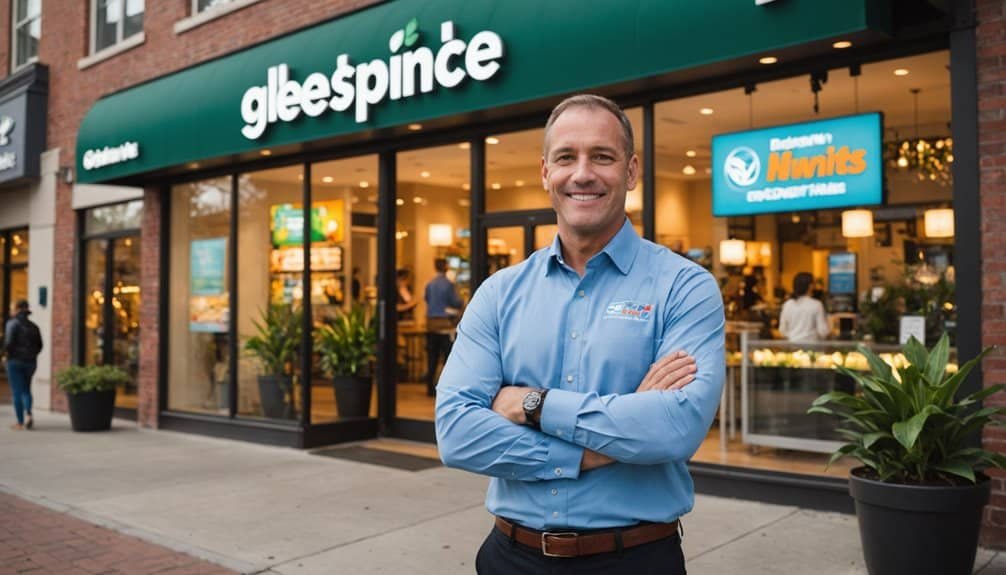Starting a business from scratch can feel overwhelming. There’s so much to figure out—names, systems, marketing, and how to get customers. That’s why many people choose to start strong with a franchise instead of navigating it alone.
Franchises come with a name people already know, a proven business plan, and training to help you learn the ropes. You also get support, tools, and a team that wants you to succeed. With thousands of franchises out there, you can find one that fits your lifestyle, budget, and goals.
For decades, I’ve helped people decide if franchising is the right path for them—and if it is, I help them find the perfect fit. It’s not about selling you something; it’s about matching you with the right opportunity. If you want to start strong with a franchise, I can help you skip the guesswork and move forward with confidence.
Essential Franchise Startup Strategies for SuccessKey Takeaways
- Conduct thorough market research to identify high-demand sectors and understand local consumer needs before selecting a franchise.
- Evaluate franchise support systems and financial viability to ensure a stable foundation for your business.
- Focus on sectors with strong growth potential, such as childcare and health/wellness, to align with evolving consumer lifestyles.
- Leverage technology, such as AI and cloud computing, to streamline operations and enhance customer engagement effectively.
- Build community connections through engagement, fostering loyalty and brand awareness while strengthening your franchise’s foundation.
Understanding the Franchise Landscape in 2025
The franchise landscape in 2025 presents a dynamic and promising environment for entrepreneurs and investors alike. With over 20,000 new franchise units anticipated, total locations will rise to 851,000 while generating approximately 210,000 jobs. The output of franchises is projected to exceed $936.4 billion, significantly contributing to a GDP growth of 5%, outpacing the broader economy. Regions like the Southeast and Southwest are becoming hotbeds of growth, attracting investments due to favorable policies and lower operating costs. Franchisors are increasingly focused on enhancing training and integrating technology, creating a supportive ecosystem for franchisees, which is crucial for operational success. This thriving landscape not only offers robust opportunities but also fosters a sense of community among franchise owners, appealing to those seeking belonging and shared success. Additionally, franchising employment is expected to exceed 9 million jobs in 2025, highlighting the sector’s impact on the workforce.
Projected Economic Growth and Opportunities
The franchise sector is poised for significant expansion, with projections indicating a 2.5% increase in establishments and over 210,000 new jobs created in the coming years. This growth not only reflects the resilience of franchising in diverse economic climates but also highlights the sector’s critical role in driving total economic output, expected to reach $936.4 billion. As businesses increasingly gravitate towards franchising, strategic opportunities arise for potential franchisees to capitalize on this upward trend. Additionally, the franchise employment growth is projected to reach 2.4% in 2025, further emphasizing the sector’s importance in the job market. Understanding financial commitments is essential for potential franchisees to make informed investment decisions.
Franchise Sector Expansion
Franchise sector expansion is poised for significant growth, driven by robust economic projections and emerging opportunities across diverse industries. With franchise output expected to reach $936.4 billion by 2025, outpacing general U.S. economic growth, the sector is becoming increasingly attractive to aspiring entrepreneurs. Private services lead with a growth rate of 4.3%, while the restaurant industry presents a prime investment opportunity amidst rising transaction volumes. Geographic trends indicate that the Southeast and Southwest will experience substantial output growth, supported by favorable business environments. Additionally, improved training and operational support from franchisors, coupled with enhanced financing options, create a solid foundation for success. This dynamic landscape invites individuals seeking belonging and stability to investigate franchise opportunities with confidence. Franchise employment is projected to increase by 2.4%, adding over 213,000 jobs, which further highlights the industry’s potential for growth. As prospective franchise owners consider their options, understanding financial readiness is critical for ensuring sustainable success.
Job Creation Trends
Amidst the promising growth of the franchise sector, job creation trends reveal a robust forecast that further underscores the industry’s potential. Projections indicate that franchise jobs will expand by 4.7% from 2023 to 2025, considerably surpassing the national average. By 2025, an estimated 402,000 new jobs will emerge, contributing to 11% of all U.S. job creation. This growth is especially evident in quick-service restaurants and individual services, with the latter experiencing a remarkable 7.8% increase. Additionally, franchises are projected to account for a significant share of total job growth in the coming years. The support provided by franchisors plays a crucial role in ensuring franchisees can effectively navigate challenges and contribute to job creation. Geographic opportunities abound, notably in the Southeastern states, which dominate franchise employment. As the franchise sector flourishes, aspiring entrepreneurs can find a strong sense of belonging in this dynamic landscape, fostering both individual and economic stability in their communities.
Job Creation Trends in the Franchise Sector

While many sectors grapple with fluctuating employment rates, the franchise industry stands out with a projected 4.7% growth in employment from 2023 to 2025, markedly surpassing the national average of 2.4%. This growth is expected to add 402,000 new jobs, raising total franchise employment to over 9 million. Franchises contribute considerably to the economy, driving 11% of national job growth, with quick-service restaurants remaining the largest employers. Private services franchises, including fitness centers and childcare, exhibit the fastest growth rate at 7.8%. As these trends unfold, people seeking stability and a sense of belonging in their careers can find promising opportunities within the vibrant franchise sector, fostering both private and professional growth. Furthermore, with franchises expected to add approximately 210,000 jobs in 2025, this reinforces their role as a key driver of local employment. Effective communication within franchise networks helps ensure that these new roles are filled with qualified candidates, further enhancing the industry’s growth prospects.
Key Regions for Franchise Expansion
The franchise industry is witnessing significant growth, and distinct regions are emerging as prime locations for expansion. Southern states like Georgia and Florida offer pro-business environments and tourism-driven demand, making them attractive for franchises. North and South Carolina capitalize on burgeoning small business sectors and hospitality opportunities. In the Southwest, Texas and Arizona stand out with their diversified economies and low tax burdens, ideal for logistics and experiential brands. Coastal markets, especially Florida and South Carolina, thrive on tourism, while urban centers such as Atlanta and Denver are ripe for fitness and health-focused franchises. Additionally, these strategic regions not only promise profitability but also foster a sense of community and belonging for franchisees and customers alike, with emerging consumer demands influencing franchise opportunities in various sectors. Understanding the franchisor’s support system can significantly enhance a franchisee’s success in these competitive markets.
High-Demand Franchise Sectors to Consider

The franchise landscape is increasingly shaped by high-demand sectors that promise substantial growth opportunities. Individual services, childcare, and health and wellness franchises are emerging as key areas where consumer interest and need are converging. Entrepreneurs looking to start strong should consider these sectors, as they not only address pressing societal demands but also offer viable paths for profitable business ventures. Additionally, entering these high-demand sectors often involves lower risk due to established business models and customer bases.
Personal Services Boom
Franchise opportunities in singular services are witnessing a remarkable surge, driven by evolving consumer demands and lifestyle changes. High-demand sectors like home services and health and wellness reflect a growing societal focus on convenience and care. The remote work trend has intensified the need for home maintenance, while sustainable practices attract eco-conscious consumers. Franchises offering vital services—such as cleaning, repairs, and senior care—benefit from recurring revenue and strong client retention. Advanced technology integration streamlines operations and improves customer engagement. As the demand for tailored, reliable services rises, potential franchisees can find belonging in these thriving sectors, capitalizing on a market projected for significant growth and stability, regardless of economic fluctuations.
Childcare Sector Growth
Growth in the childcare sector presents a compelling opportunity for aspiring franchisees, as increasing urbanization and dual-income households drive an unmatched demand for quality childcare services. With the preschool franchise market projected to reach $15 billion by 2025 and daycare services adding an estimated $182.5 billion by 2029, significant investment potential exists. The demographic shift towards structured early childhood education and the need for reliable daycare options further bolster this demand. Franchisees can thrive by focusing on age-specific programs and utilizing technology-driven solutions. Despite challenges such as high startup costs and intense competition, those who adapt to regional needs and engage with the community can carve a successful niche in this burgeoning market, fostering a strong sense of belonging for families.
Health and Wellness Franchises
As consumers increasingly prioritize health and wellness, the franchise landscape has become a fertile ground for investment opportunities. The U.S. health and wellness industry, projected to reach $480 billion by 2024, is growing rapidly, driven by fitness, nutrition, and mental health. Importantly, franchises dominate this sector, with 60% in fitness and 22% in beauty services. Boutique fitness franchises and clean beauty brands are thriving, catering to Millennials and Gen Z’s demand for accessible, community-focused experiences. Moreover, established franchises offer consistent quality and support systems that mitigate risks for new owners. With technology enhancing operational efficiency, health and wellness franchises present a strategic avenue for those seeking to belong to a dynamic and impactful industry.
The Impact of Business-Friendly Policies

When business-friendly policies are enacted, they create an environment conducive to franchise success and expansion. These policies streamline registration, reduce bureaucratic burdens, and offer tax incentives that improve profitability. For aspiring franchisees, understanding these dynamics is vital.
| Business Climate | Tax Incentives |
|---|---|
| Streamlined registration | Low/no income tax |
| Supportive government | Corporate tax breaks |
| Minimal administrative hurdles | Grants and subsidies |
These elements attract franchises, ensuring a robust market demand with high purchasing power and population growth. Moreover, well-balanced franchise regulations protect rights and support operational flexibility. Ultimately, a favorable business environment fosters a sense of belonging, enabling entrepreneurs to thrive within a supportive community.
Strategies for Successful Franchise Establishment
Successful franchise establishment hinges on thorough market research, the selection of an appropriate franchise model, and the development of robust marketing strategies. By understanding local demand and aligning with a franchise that meets those needs, franchisees can position themselves for long-term success. Furthermore, practical marketing efforts are crucial to building brand awareness and attracting a loyal customer base from the outset.
Research Market Demand
How can franchise entrepreneurs effectively gauge market demand to secure a strong foundation for their business? They must employ a multifaceted approach, beginning with data-driven demand forecasting. Analyzing historical sales data and applying quantitative models helps identify emerging trends. Furthermore, understanding the competitive landscape is essential; mapping competitors’ strengths and weaknesses reveals opportunities and potential barriers. Demographic and economic evaluations provide insights into consumer behavior, aligning franchise offerings with local preferences. Entrepreneurs should engage in qualitative research through surveys and focus groups for deeper insights. Implementing these methodologies guarantees that franchisees can adapt to shifting market dynamics, ultimately fostering a sense of belonging in the community while establishing a resilient business framework.
Choose the Right Franchise
Choosing the right franchise is vital for entrepreneurs aiming to establish a successful business, as it lays the groundwork for long-term sustainability and profitability. Evaluating franchisor support, such as thorough training programs and marketing assistance, guarantees that franchisees receive the resources necessary for success. Financial viability is critical; analyzing the Franchise Disclosure Document (FDD) helps assess initial investments and projected returns. Investigating brand reputation through franchisee feedback and customer reviews can reveal insights into loyalty and satisfaction. Moreover, aligning franchise requirements with individual skills and operational demands fosters a conducive environment for success. Lastly, strategic location and competitive analysis confirm that the franchise can thrive in its chosen market, ultimately enhancing community integration and belonging.
Develop Strong Marketing
Establishing a strong marketing strategy is a fundamental component of franchise success, building on the foundation laid by selecting the right franchise. Leveraging social media, especially platforms like Instagram and Facebook, allows franchises to engage directly with a vast audience of 5.17 billion users. Digital advertising emerges as a critical tool, with 72% of franchises recognizing its effectiveness in generating leads. By integrating SMS marketing, franchises can achieve remarkable open rates and foster two-way communication, enhancing customer loyalty. Consistent branding, combined with localized campaigns, resonates deeply within communities. An omnichannel approach guarantees seamless interactions across platforms, reinforcing brand identity. Together, these strategies create a robust marketing ecosystem, inviting customers to connect and belong.
Embracing Digital Transformation in Franchising
A significant opportunity lies in the digital transformation of franchising, poised to reshape the industry landscape. As franchises adopt technology, they can improve customer experiences and operational efficiency. Key areas of focus include:
- AI and Data Analytics: Utilizing big data and AI enables franchises to make informed decisions, streamlining operations and tailoring customer interactions.
- Cloud Computing: This technology facilitates remote access, enabling franchisees to manage their businesses flexibly and efficiently.
- IoT Applications: Internet of Things innovations improve communication speed and customer engagement, ensuring franchises remain competitive.
Navigating Economic Challenges in the Franchise Market

As economic pressures continue to mount, franchise owners must strategically navigate a landscape fraught with challenges, including inflation, labor shortages, and fluctuating interest rates. The franchise sector is poised for growth, yet owners must remain vigilant and adaptable to succeed.
| Challenge | Impact | Strategic Response |
|---|---|---|
| Inflation | Strains operational margins | Cost management and pricing strategies |
| Labor Shortages | Limits staffing capabilities | Focus on recruitment and retention |
| Interest Rate Fluctuations | Affects financing costs | Investigate fixed-rate options |
| Market Consolidation | May favor larger operators | Foster community and local ties |
The Future of Franchising: Trends and Predictions
While the franchise landscape is evolving rapidly, emerging trends and predictions indicate a promising future for the sector. The growth trajectory is expected to accelerate, with significant increases in both locations and output. Key trends shaping the future of franchising include:
- Technological Integration: The adoption of AI and digital tools will improve operational efficiency and customer engagement, allowing franchises to thrive in competitive markets.
- Consolidation Trends: As private equity firms acquire multi-unit franchises, opportunities for single franchise owners will emerge, reshaping ownership dynamics.
- Regulatory Changes: Stricter regulations on fees will push franchisors towards greater transparency, creating a more equitable environment for franchisees.
Frequently Asked Questions
Want to start strong with a franchise but not sure where to look?
Consider industries that are growing fast—like home services, fitness, and senior care—so you can ride a wave of demand instead of chasing customers. A good franchise broker can help you match your budget, lifestyle, and interests with the right opportunity.
What Are the Initial Costs for Starting a Franchise?
Initial costs for starting a franchise typically range from $10,000 to $350,000, with some exceptions. Several factors, including location and industry, influence total investments, which can escalate considerably depending on brand and operational requirements. Initial costs usually include franchise fee, operating costs for the first year, and living costs during the start-up phase.
How Do I Choose the Right Franchise for Me?
Choosing the right franchise involves evaluating market demand, competition, and franchisor support. Considering individual interests and financial goals guarantees alignment, fostering belonging within the selected brand and community while maximizing potential for success and customer loyalty.
What Support Do Franchises Provide to New Owners?
Franchises often offer invaluable support, with 92% providing ongoing mentorship and technology assistance. This structured guidance helps new owners thrive, fostering a sense of community and belonging while steering them through the complexities of business ownership successfully.
Are There Specific Qualifications Needed to Open a Franchise?
Specific qualifications for opening a franchise include financial stability, entrepreneurial spirit, leadership skills, brand alignment, and compliance with legal requirements. These criteria guarantee prospective owners are equipped for successful business management and growth within the franchise system.
How Long Does It Take to Become Profitable in a Franchise?
Typically, franchises achieve profitability within 1–3 years, influenced by initial costs, market demand, and operational models. Understanding these factors helps prospective franchisees manage expectations and develop a strategic plan for financial success in their ventures.
Conclusion
Owning a franchise means you don’t have to figure everything out on your own. You get a clear path, real training, and help when you need it—all designed to give you a better shot at success. That’s a big reason why so many people are choosing franchising over starting from scratch.
The world of franchising is constantly growing, with new ideas and industries popping up every year. Whether you’re into food, fitness, home services, or something totally different, there’slikely a franchise that fits your interests and goals.
If you’re curious about what might be a good match for you, it’s worth taking a closer look. You don’t have to decide today, but it never hurts to explore your options.
References
https://www.franchise.org/franchising‑economic‑outlook/
https://www.franchising.com/articles/_franchising_exceeds_economic_expectations.html
https://franzy.com/blog/franchising‑industry‑statistics‑2025/
https://www.entrepreneur.com/franchises/why‑franchising‑will‑outpace‑the‑us‑economy‑in‑2025/490262
https://franchise.livepicturestudios.com/blog‑posts/revolutionizing‑u‑s‑franchise‑growth‑2025
https://www.paperchase.ac/market/the‑franchise‑industrys‑2025‑outlook/
https://fortunly.com/statistics/franchise‑statistics/
https://ignitevisibility.com/franchise‑trends‑2025/
https://franchiscreator.com/2025‑franchising‑economic‑outlook‑job‑growth‑and‑market‑trends/
https://www.webfx.com/industries/franchises/statistics/

